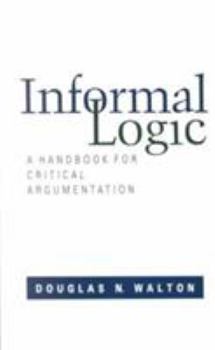Informal Logic: A Handbook for Critical Argumentation
Select Format
Select Condition 
Book Overview
This is an introductory guidebook to the basic principles of how to construct good arguments and how to criticeze bad ones. It is non-technical in its approach and is based on 150 key examples, each... This description may be from another edition of this product.
Format:Paperback
Language:English
ISBN:0521379253
ISBN13:9780521379250
Release Date:July 1989
Publisher:Cambridge University Press
Length:310 Pages
Weight:0.85 lbs.
Dimensions:8.5" x 0.8" x 5.5"
Customer Reviews
5 ratings
Informal Logic
Published by Jacket.books , 5 years ago
If you are very interested in learning more about properly structuring and identify arguments then you will probably enjoy this book. One thing that I think this book excels at is demonstrating the importance of context/nuance in discussions. As the author points out at various points when discussing different fallacies there are times when something typically thought of as fallacious might not be so given previous commitments or concessions made during a discussion. The section of deductive validity was easy to follow, as was the section on inductive validity/claims, and there is a good chunk of the book dedicated to the assessment of various types of fallacious arguments.
Great start for everyone
Published by Thriftbooks.com User , 19 years ago
This book is really impressive. Although I would not state that it is a "beginner's course" to argumentation, it is certainly for those seeking to understanding argumentation in all its forms in a friendly and accessible format. Further, this book's greatest strength is its use of examples and situational argumentation from present day. Through the use of many examples, the reader is able to better grasp each point the author seeks to make. Each argumentation style is properly illustrated with a helpful example. After one reading, I was able to listen to people in discussion or argument and identify fallacies or validities. If you are seeking a book that catalogs many of the most common uses of argumentation, and their limitations, then this is the book for you. Further, this is a great book for anyone trying to understand the gap between deduction and induction!
Don't You Agree That No Right Thinking Person Would Find Fault With This Book?
Published by Thriftbooks.com User , 19 years ago
The title is an example of overly aggressive questioning and a fallacious attempt to end debate by labeling anyone who disagrees a dunce. In a courtroom the question would be disallowed on the legal grounds that it is argumentative. In the newsroom, the boardroom, and just about any other type of room where people gather to discuss issues, that type of question is asked every day. Walton clearly (but ponderously) explains why questions of this type (and questions and arguments of many other types) are just plain wrong and shouldn't be tolerated. He not only explains why they're wrong, unlike other books on informal logic that I've read, he gives advice on how to answer them. As a professional who spent 32 years asking questions and making arguments in a courtroom, I wish that I had read this book at the beginning of my career rather than at the end. Walton does tend to beat a dead horse, however. Although repetition is the surest method of teaching, as a rule of thumb, three repetitions of a point should suffice. One other minor quibble. He is occasionally guilty of faulty analysis himself. In analyzing the hunter/anti-hunter debate, he said that the hunter's reply about meat eaters being in a poor position to criticize hunting was a weak argument. He found very little parallel between slaughtering innocent wild animals and eating hamburgers. The parallel is this: The objective of hunting is to eat what you kill. (If you're not dedicated to this proposition, stay out of the woods). In order to eat the hamburger, somebody has to slaughter the innocent cow for you. The difference between the hamburger eating anti-hunter and the venison eating hunter is who killed the food and whether they did it for sport or a paycheck.
Some of Walton's Best Work
Published by Thriftbooks.com User , 23 years ago
Douglas Walton is the most prolific writer on the subject of logical fallacies, and this book is a distillation of many years of teaching and writing on the subject up to 1989. While it presages his more recent theoretical works in the pragma-dialectical tradition such as A Pragmatic Theory of Fallacy and The New Dialectic, you will get in this book an approach with substantial points of contact with good recent approaches like Govier's ARG approach to argument appraisal, or Damer's extension of it (which in the latest version of his Attacking Faulty Reasoning drifts a bit more in the pragma-dialectical tradition).I found his discussions to be quite illuminating. They are much more subtle than most, and he brings to bear on fallacy analysis a far richer toolbox of techniques drawn from logic, as well as rhetoric and communications studies.That being said, I don't think this would make a good text for an undergraduate course in critical thinking or informal logic--the methodology is too still too idiosyncratic, the distinctions too subtle. I'd go with Zachary Seech or Trudy Govier rather than Walton. On the other hand, this would be a good book for upper-level courses in informal logic for communication studies or journalism students.I think it deserves a place in the library of anyone teaching this material, but it's not the best place for someone approaching this material fresh to start at.
Excellent as a starting point
Published by Thriftbooks.com User , 28 years ago
Informal Logic exposes the reader to a formal analysis of their everyday thought. You will be able to use the material to recognize (and respond properly to) types of arguments and fallacies that previously had gone unrecognized. If you would like to become better at arguing your point, this is a good starting point.





